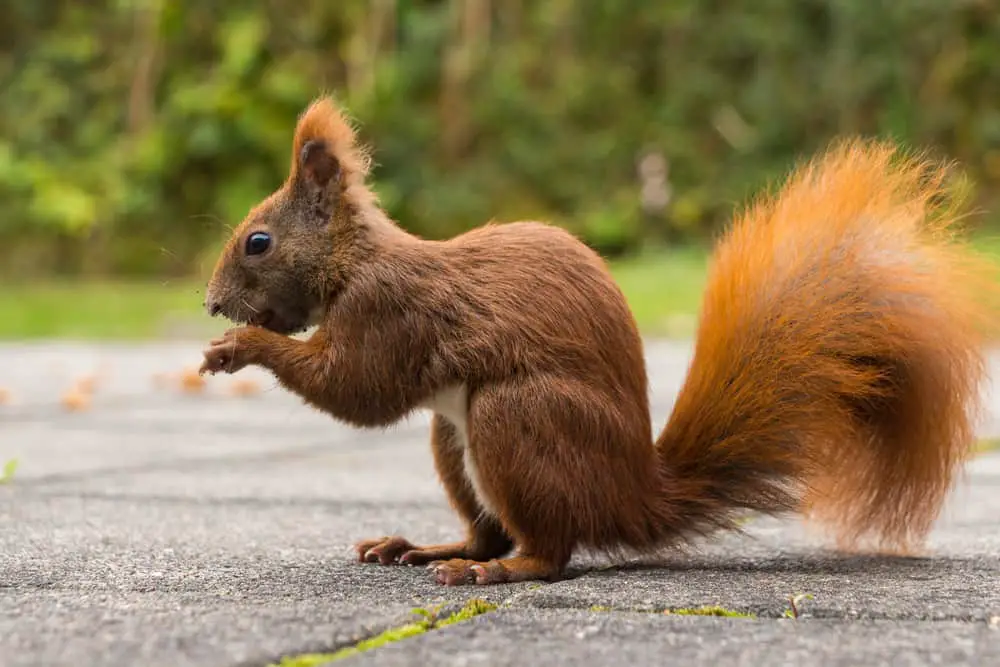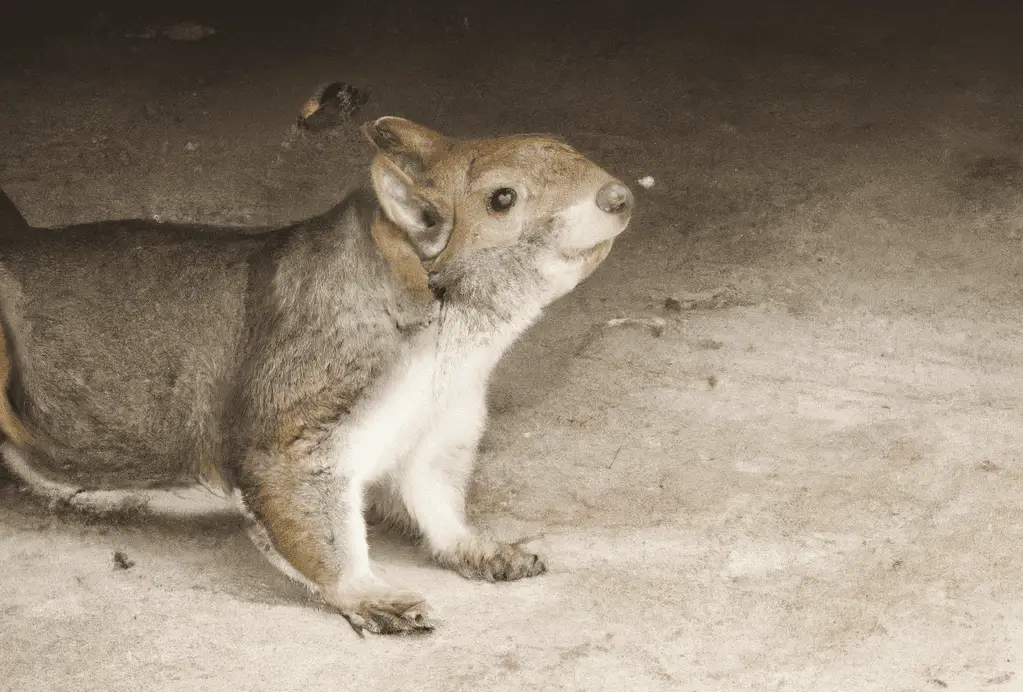Garages are great for workshops, storage, and even parking a car. All that extra space protected from the elements and usually full of warm dark corners to hide in can quickly become a haven for unwanted pests.
Pet food and trash cans kept in garages can attract squirrels and other pest animals. Reliable food sources and water sources can encourage mother squirrels to nest nearby our garages and try to make their way inside. But if they get inside, will squirrels stay in the garage?
Do Squirrels Move into Garages?
It is entirely possible for wild animals with bushy tails to move into your garage and locate sources of food and security. Squirrels will try to get into garages through broken windows, gaps in the wall and ceiling, loose shingles, or any cracks or openings along the foundation. Once inside, a female squirrel is likely to build a nest and have some baby squirrels inside your garage.
How Do You Know if There’s a Squirrel in the Garage?
It can be difficult to locate a squirrel nest in your garage if you are unsure of what to look for. Keep an eye out for squirrel droppings and lookout for squirrel nests in the corners and tall, isolated areas of your garage. Some squirrels will burrow into boxes or make their way behind furniture or storage racks. Other rodents can be sighted in these areas too.
Squirrel activity is most noticeable during the day, but noises like chattering and squeaking can be heard from nests at night. If you are noticing increased squirrel behavior near your garage and along your roof, as well as signs of squirrel intrusion inside, then you may need to consider looking into squirrel removal services.
Removing a Squirrel From a Garage Safely and Humanely
Squirrels can be major pests, and a determined squirrel can cause major issues in your home and garage. Squirrel droppings and urine left uncleaned can lead to foul smells and dangerous diseases if inhaled. There are also chances of dead baby squirrels ending up in your walls which can be an expensive and unpleasant removal situation.
If a male squirrel or a female without babies is living in the garage, then you should be able to trap it yourself. To avoid hurting squirrels, you should use a live trap and humanely catch and relocate these cute-looking creatures. If the squirrel has babies, then you will want to contact a reliable squirrel removal service or wait until they are old enough to leave the nest on their own.
When setting a squirrel trap, make sure to place the food all the way in the back so the squirrel will step on the trip plate and activate the door. Wear gloves when setting the trap and the bait, so your scent doesn’t scare the squirrel away. Make sure to check the trap once in the morning and once in the evening, and change the food bait as necessary.
Squirrels should never be left in a trap for more than 24 hours. Relocate a squirrel at least 15 miles from your home so it cannot return to its nest.
Other Pests That Invade a Garage

The harm caused in a garage by squirrels and pests can be severe if it is left untreated. Most of the damage done occurs in garages that are untidy or seldom cleaned. The nesting materials, dark spaces, and access to food and water sources can invite a host of pets into your garage.
A well-sealed garage is a must to keep many types of critters out. Storing food waste, trash bins, and other attractants in a garage can lead to issues unless they are properly closed. Most wild animals will move into a garage to avoid extreme temperatures, so be on the lookout for some of these pests during winter and summer.
| Pest | How It Gets In | Where It Lives |
| Skunk | Foundation holes and cracked ground-level entry points | In burrows and low to the ground. Will likely dig into the side of the garage and nest deep in the wall |
| Squirrel | Broken windows and loose shingles, as well as gaps and open doors | High ceiling areas or nest in old storage areas. |
| Mice | Cracks, holes, and any openings | Walls, furniture, and storage boxes |
| Flies and Bugs | Open windows, doors, and cracks | Walls, ceilings, drains, and storage containers |
| Snakes and Lizards | Under doors and through gaps and cracks | Drains and under shelves and workbenches |
| Possum | Ceiling and wall gaps | High in the garage or loft spaces |
| Birds | Gaps, cracks, and openings | High on window ledges, cross beams,9 and the top of storage shelves |
Skunk
While not the most common pest to live in our garage, their musky scent has been detected in and around the places we park our cars. If a skunk gets into your garage, you will know immediately but may have a difficult time getting rid of it without getting sprayed.
Skunks will try to burrow in as deep as they can into your garage and, like most wild animals, should not be cornered. Wait until night when a skunk goes out to forage, and then seal the way it comes and goes. If you are unable to figure out how it gets in and out, call a wildlife removal company to help you out.
Mice
These are likely found everywhere humans and food sources are, so there is a good chance that your garage is a livable location. Keeping mice out of your garage can be hard so setting traps or using repellents is a good idea. Make sure anything you use to stop the mice is child and pet friendly or else well out of reach of either.
Flies and Bugs
These can get into your home through several methods. A lot of them come up through the drains or enter when windows or doors are open for ventilation. Some bugs, like wasps and hornets, can cause serious pain and anguish, whereas other pests, like flies, are just bothersome. Traps and repellents for flying and crawling insects are a must to keep your garage pest free.
Snakes and Lizards
These are likely to enter your home to escape bad weather or while chasing prey. Once inside, if conditions are favorable, these reptiles may move in for the long term. Make sure to reduce food sources for these intruders unless you like the idea of having reptiles act as a pest control service in your garage.
Possum
Mother possums will move into a garage to have a safe place to raise their young. The protection from the elements and easy access to food and water can lure possums into your garage to nest. Keeping bright lights on at night and having a radio play human voices can help keep them out of your space.
Birds
It is very common for birds to build nests in your garage. While your door is open during the day, birds will busily build a nest and then enjoy the safety of a sealed place to sleep at night. Until the babies are making noise, it can be hard to detect birds building nests in your garage. Wire mesh around high openings and fixing any damaged entry points can keep birds from getting into an otherwise sealed garage.
Squirrel
Most garages will have a squirrel or two move in over the years. Most of the time, it is easy to remove them by cleaning up and sealing up after they leave. Some garages have too many gaps for this to work, and others have high spaces that you can’t really access. In these cases, call a professional to help you with your squirrel pests. Pets like cats and dogs can help the most in keeping unwanted squirrels and other pests out of your garage for good.


